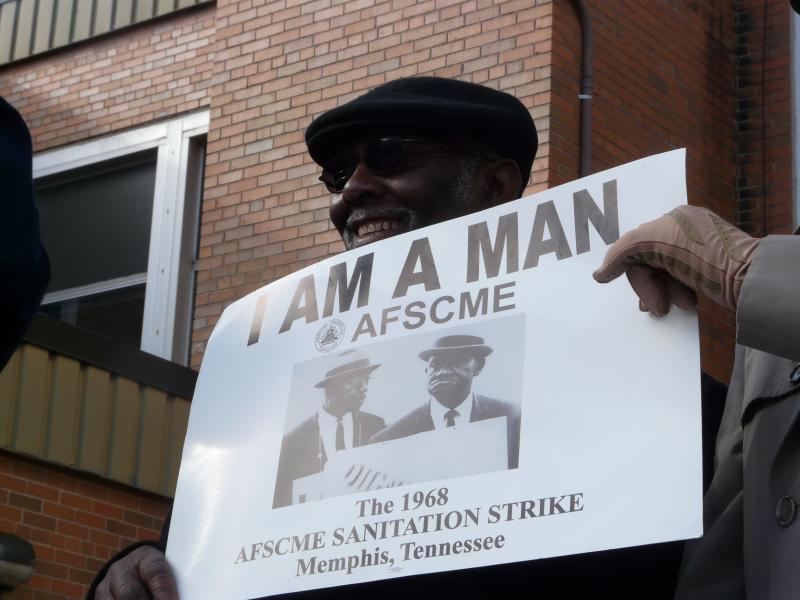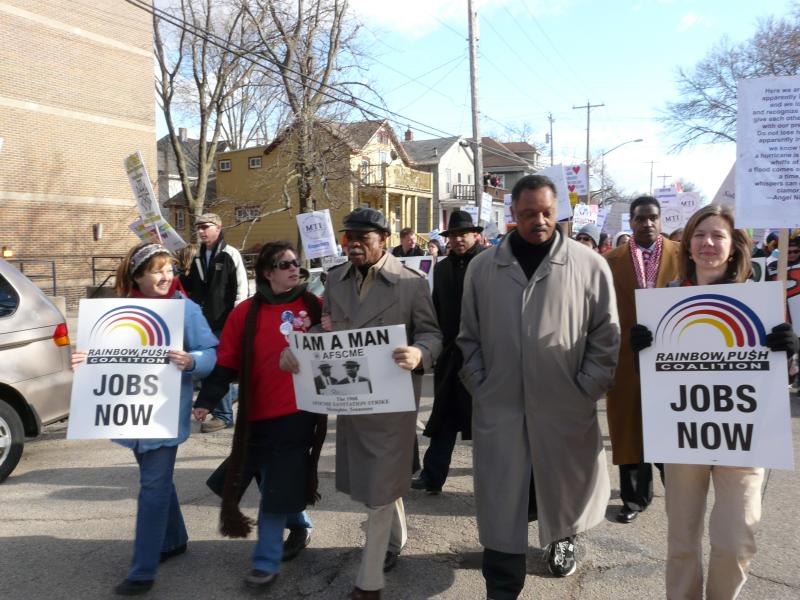Two Who Marched With King Take the Long Road from Memphis to Madison
Now, let me say as I move to my conclusion that we've got to give ourselves to this struggle until the end. Nothing would be more tragic than to stop at this point, in Memphis. We've got to see it through. And when we have our march, you need to be there. Be concerned about your brother. You may not be on strike. But either we go up together, or we go down together. –- Dr. Martin Luther King Jr. in his last speech in Memphis
Two men who were a part of the historical transformation of this country during the Civil Rights Movement of the 1960s stood humbly in the background Monday at different rallies across Madison. Part of the original group of sanitation workers in Memphis who went on strike for the right to collectively bargain, Elmore Nickleberry and Baxter Richard Leach, each answered with gentlemanly nonchalance when asked why they came on the long trip from Memphis to Madison: "Because Jesse asked us to."

Yes, their fight was much steeper and more difficult a climb, but King's famous "I Have Seen the Mountaintop" speech to workers on that April 3rd night is strikingly relevant to today's protests. In the final months leading up to his appearance in Memphis and his untimely death on April 4th, King had concentrated his efforts on the Poor People's Campaign for economic opportunity and equality in conjunction with other civil rights workers, including Rev. Jesse Jackson. Although threats of mounting violence and a fractured civil rights movement were apparent to King, he deemed the workers' strife in Memphis important enough to pay a personal visit to the polarized and segregated city.
Nickleberry's wife explained in the ride over to the "Memphis to Madison" rally at the Capitol yesterday that the protests in Memphis started after several incidents highlighted the unfair treatment of black workers: Two sanitation workers were crushed by a faulty piece of machinery and their families received $500 for a funeral and one month's pay. And on the same day, a group of 22 black sanitation workers were sent home without pay on account of rain, while their white supervisors were kept on and paid. The strikes, involving 1300 people, began 12 days after King was murdered.
"My husband was paid around $1 before the strikes," said his wife. "Afterwards, he got $1.80."
Compared to the relative peace and good-naturedness surrounding the Wisconsin protests, Leach said the atmosphere in Memphis was much more strained and dire as the 65-day strike persisted. "We struggled every day for our fight, and it was an unfriendly feeling towards us," he said.
The Memphis businesses that were boycotted as part of the labor actions felt the brunt of the black workers' efforts, and those of their supporters. Leach said that people would go into the stores, fill up carts and baskets, and then leave them in the middle of the store so the clerks would have to put everything back.
"We went into the grocery stores and the clothing stores and all the stores, and would fill all the carts up to the top and just leave 'em there so the people would have to clean up everything," Leach said.

Both men marched with King during the protests, and felt a sense of camaraderie and "family" with their fellow strikers, many whom Leach said were involved in the first walk-out in Memphis between 1961 and 1962. But there were no notable results from their unionization as AFSCME workers in the early 1960s. It took the extreme climate of injustice and support from the civil rights movement that King spearheaded for the Memphis workers to gain ground against their uncompromising mayor, Henry Loeb.
There are many parallels between the fights in Madison and Memphis: similar autocratic-leaning elected officials, and similar struggles to gain collective bargaining rights and similar movement leaders. But can the parallels between Wisconsin's fight against corporate government and the Memphis workers' fight against unfair working conditions and treatment be enough for our lawmakers to learn from history? In states like Wisconsin and Ohio, it doesn't seem like they have.
"We are here to help the people," said Leach. "People in Wisconsin have to stick together in the struggle. They have to stand as one and don't give up."
The two men who were a part of this country's history decided to come to Madison and lend their stories of struggle to a new generation of activists. Their presence showed the gravity of what is at stake in this state and around the country. Many have risked their lives in their struggle for equality, and as Rev. Jackson said at the Madison rally, the sacrifices made by Dr. King and other civil rights martyrs gives "this generation a special burden and opportunity to battle the system."




